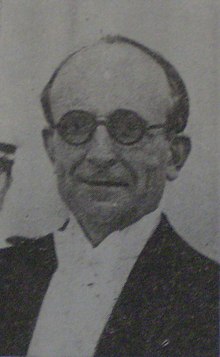Salvador de Madariaga
Salvador de Madariaga y Rojo (born July 23, 1886 in A Coruña ; died December 14, 1978 in Muralto , Switzerland ) was an emigrated national- liberal Spanish diplomat and writer .
Life
Madariaga was born on July 23, 1886, the son of a Basque officer. He attended school in Madrid at the Instituto del Cardenal Cisneros . At the age of 14 he came to Paris , where he studied mechanical engineering at the École polytechnique between 1906 and 1908 . He completed this course with a diploma. In the same year he enrolled at the École des Mines for engineering. He finished this course as the best in his class.
Madariaga began working as a journalist while still a student . He kept this job while he was employed as an engineer at the northern Spanish railway company from 1911.
In 1912 Madariaga married the Scottish economic historian Constance Archibald. With her he had two daughters. In 1916 Madariaga left the railway administration in Madrid and went to London as a correspondent for the Times and stayed with this newspaper until 1921. He then worked as a freelance writer and journalist.
In 1927 Madariaga accepted a call to Oxford and took a chair in Spanish literature . After the proclamation of the second Spanish republic , he immediately returned to his homeland. He was elected to the National Assembly and went to Washington as ambassador in May 1931 .
From 1932 to 1934 he was ambassador to Paris. At the same time he was a member of the Spanish embassy to the League of Nations between 1931 and 1936 ; he also held the post of Spanish Minister of Education for a short time in 1934. In 1936 Madariaga emigrated to Oxford , where he taught at his former college for the next 40 years. In 1948 he took part in the Hague European Congress as President of the Cultural Commission and in 1949 was one of the co-founders of the College of Europe in Bruges. When his wife died in 1970, Madariaga married Emilia Székely-Rauman that same year.
In 1972 Madariaga went to Switzerland and settled in Locarno . Only after the death of General Franco did he return to Spain for a visit. Forty years late, he gave his inaugural address at the Spanish Academy of Language in Madrid.
Salvador de Madariaga was awarded the Charlemagne Prize in 1973 , which he received for contributions to the European idea and peace in Europe.
A part of the building of the European Parliament in Strasbourg bears his name (abbreviated: SDM).
At the age of 92, Salvador de Madariaga y Rojo died on December 14, 1978 in Muralto near Locarno in Switzerland. He is the great-uncle of Javier Solana .
Works
- The heirs of the Conquistadors. Deutsche Verlags-Anstalt GmbH, Stuttgart 1947.
- Portrait of Europe. Authorized German translation from English by Herbert von Borch , Stuttgart: Deutsche Verlags-Anstalt 1958.
- Cortés. Conqueror of Mexico. Books of the world. Droemersche Verlagsanstalt Th. Knaur Nachf., Munich-Zurich 1960.
- Simon Bolivar. The Liberator of Spanish America. Manesse-Verlag, Zurich 1986, 2nd edition 1989, ISBN 3-717-58066-3 ; German first under the title Bolivar. German publishing company, Stuttgart 1961.
- The West: Army without a banner. A Cold War Strategy. Scherz Verlag, Stuttgart 1961.
- Tomorrow without noon. Memoirs 1921–1936. Propylaea Verlag, Berlin 1972.
- Columbus. Discoverer of new worlds. Wilhelm Heyne Verlag, Munich 1975.
- Portrait of Europe. Stuttgart 1939.
- The heart of jade. Alfred Scherz Verlag, Bern 1957.
- Spain. Deutsche Verlags-Anstalt, Stuttgart 1979 (3rd edition). ISBN 3-421-01925-8 .
- A drop of time. Alfred Scherz Verlag, Bern 1961.
literature
- Thomas Nitzsche : Salvador de Madariaga: Liberal - Spaniard - Citizen of the world: the path of a political intellectual through Europe of the 20th century. Jena, Univ., Diss., 2008 ( online )
Web links
- Literature by and about Salvador de Madariaga in the catalog of the Ibero-American Institute in Berlin
- Literature by and about Salvador de Madariaga in the catalog of the German National Library
- Works by and about Salvador de Madariaga in the German Digital Library
- Newspaper article about Salvador de Madariaga in the 20th century press kit of the ZBW - Leibniz Information Center for Economics .
- Literature by and about Salvador de Madariaga in the catalog of the library of the Instituto Cervantes in Germany
- La Cueva de Zaratustra Madariaga and its Memorias de un federalista
- Page of the Charlemagne Prize on Salvador de Madariaga
- Archival material by and about Salvador de Madariaga can be viewed in the EU Historical Archives in Florence
| personal data | |
|---|---|
| SURNAME | Madariaga, Salvador de |
| ALTERNATIVE NAMES | Madariaga y Rojo, Salvador de |
| BRIEF DESCRIPTION | Spanish politician, emigrant and writer |
| DATE OF BIRTH | July 23, 1886 |
| PLACE OF BIRTH | A Coruña |
| DATE OF DEATH | December 14, 1978 |
| Place of death | Muralto , Switzerland |

